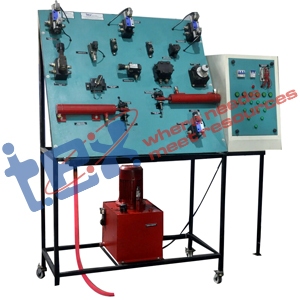

The Hydraulic Trainer is a comprehensive fluid power educational setup designed to help students understand the principles of hydraulic systems, components, and circuit operations. This hydraulic lab equipment provides hands-on training in fluid mechanics and industrial automation, allowing learners to design, assemble, and test various hydraulic circuits.
Ideal for Engineering Colleges, Polytechnics, ITIs, and Research Laboratories, the trainer serves as a complete learning platform for students studying mechanical, electrical, and instrumentation engineering. Built with industrial-grade components and a robust design, this hydraulic system trainer replicates real-world hydraulic operations used in industries such as manufacturing, automation, and process control.
This hydraulic training kit includes a power pack, directional control valves, flow control valves, pressure gauges, actuators (cylinders), and a clear, panel-mounted piping layout. It allows students to connect different components using flexible hoses and quick couplings to form functional hydraulic circuits.
With the hydraulic trainer educational setup, students can perform experiments on flow control, pressure regulation, speed control, sequencing, and actuator synchronization. The system is equipped with pressure relief mechanisms and visual indicators for safe and efficient operation.
The hydraulic training bench for labs provides practical knowledge of hydraulic circuits, component identification, and troubleshooting techniques. The setup is user-friendly, durable, and ideal for continuous use in academic environments.
| Specification | Details |
|---|---|
| Power Supply | 230V AC, 50Hz |
| Power Pack | Hydraulic pump with oil reservoir |
| Valves | Directional, pressure, and flow control valves |
| Actuators | Single and double-acting hydraulic cylinders |
| Working Fluid | Hydraulic oil |
| Pressure Range | Up to 50 bar (model specific) |
| Piping | Flexible hoses with quick coupling |
| Measuring Instruments | Pressure gauges, flow control meters |
| Construction | MS powder-coated frame with labeled panel |
| Safety Features | Pressure relief valve, overload protection, spill-resistant design |
The Hydraulic Trainer provides hands-on exposure to the operation and maintenance of hydraulic systems, bridging the gap between theoretical learning and industrial application. Students can simulate various hydraulic control operations and gain confidence in troubleshooting and system analysis.
This setup is invaluable for understanding the principles of energy transmission through fluids, system efficiency, and the role of hydraulic control components in automation. It serves as an essential part of modern technical education, preparing students for real-world challenges in industrial and automation engineering.